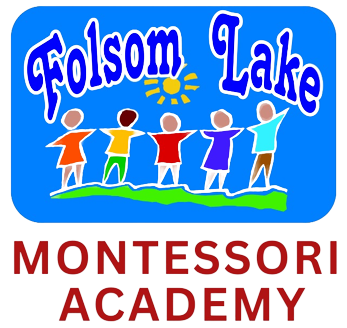FAQs
Folsom Lake Montessori Academy
FAQs
Folsom Lake Montessori Academy
Two- and three-day programs are often attractive to parents who do not need full-time care; however, five-day programs create the consistency that is so important to young children and which is essential in developing strong Montessori programs. Since the primary goal of Montessori involves creating a culture of consistency, order, and empowerment, most Montessori schools will expect children to attend five days a week.
Dr. Montessori’s focus on the “whole child” led her to develop a very different sort of school from the traditional teacher-centered classroom. To emphasize this difference, she named her first school the “Casa dei Bambini”or the “Children’s House.”
The Montessori classroom is not the domain of the adults in charge; it is, instead, a carefully prepared environment designed to facilitate the development of the children’s independence and sense of personal empowerment. This is a children’s community. They move freely within it, selecting work that captures their interest. In a very real sense, even very small children are responsible for the care of their own child-sized environment. When they are hungry, they prepare their own snacks and drinks. They go to the bathroom without assistance. When something spills, they help each other carefully clean up.
Four generations of parents have been amazed to see small children in Montessori classrooms cut raw fruits and vegetables, sweep and dust, carry pitchers of water, and pour liquids with barely a drop spilled. The children normally go about their work so calmly and purposely that it is clear to even the casual observer that they are the masters in this place: The “Children’s House.”
The Montessori classroom is not the domain of the adults in charge; it is, instead, a carefully prepared environment designed to facilitate the development of the children’s independence and sense of personal empowerment. This is a children’s community. They move freely within it, selecting work that captures their interest. In a very real sense, even very small children are responsible for the care of their own child-sized environment. When they are hungry, they prepare their own snacks and drinks. They go to the bathroom without assistance. When something spills, they help each other carefully clean up.
Four generations of parents have been amazed to see small children in Montessori classrooms cut raw fruits and vegetables, sweep and dust, carry pitchers of water, and pour liquids with barely a drop spilled. The children normally go about their work so calmly and purposely that it is clear to even the casual observer that they are the masters in this place: The “Children’s House.”
By the end of age five, Montessori children are normally curious, self-confident learners who look forward to going to school. They are normally engaged, enthusiastic learners who honestly want to learn and who ask excellent questions.
Montessori children by age six have spent three or four years in a school where they were treated with honesty and respect. While there were clear expectations and ground rules, within that framework, their opinions and questions were taken quite seriously. Unfortunately, there are still some teachers and schools where children who ask questions are seen as challenging authority. It is not hard to imagine an independent Montessori child asking his new teacher, “But why do I have to ask each time I need to use the bathroom?” or, “Why do I have to stop my work right now?” We also have to remember that children are different. One child may be very sensitive or have special needs that might not be met well in a teacher-centered traditional classroom. Other children can succeed in any type of school.
There is nothing inherent in Montessori that causes children to have a hard time if they are transferred to traditional schools. Some will be bored. Others may not understand why everyone in the class has to do the same thing at the same time. But most adapt to their new setting fairly quickly, making new friends, and succeeding within the definition of success understood in their new school. There will naturally be trade-offs if a Montessori child transfers to a traditional school. The curriculum in Montessori schools is often more enriched than that taught in other schools in the United States. The values and attitudes of the children and teachers may also be quite different. Learning will often be focused more on adult-assigned tasks done more by rote than with enthusiasm and understanding.
Montessori children by age six have spent three or four years in a school where they were treated with honesty and respect. While there were clear expectations and ground rules, within that framework, their opinions and questions were taken quite seriously. Unfortunately, there are still some teachers and schools where children who ask questions are seen as challenging authority. It is not hard to imagine an independent Montessori child asking his new teacher, “But why do I have to ask each time I need to use the bathroom?” or, “Why do I have to stop my work right now?” We also have to remember that children are different. One child may be very sensitive or have special needs that might not be met well in a teacher-centered traditional classroom. Other children can succeed in any type of school.
There is nothing inherent in Montessori that causes children to have a hard time if they are transferred to traditional schools. Some will be bored. Others may not understand why everyone in the class has to do the same thing at the same time. But most adapt to their new setting fairly quickly, making new friends, and succeeding within the definition of success understood in their new school. There will naturally be trade-offs if a Montessori child transfers to a traditional school. The curriculum in Montessori schools is often more enriched than that taught in other schools in the United States. The values and attitudes of the children and teachers may also be quite different. Learning will often be focused more on adult-assigned tasks done more by rote than with enthusiasm and understanding.
Montessori is not opposed to competition; Dr. Montessori simply observed that competition is an ineffective tool to motivate children to learn and to work hard in school. Traditionally, schools challenge students to compete with one another for grades, class rankings, and special awards. For example, in many schools tests are graded on a curve and are measured against the performance of their classmates rather than considered for their individual progress.
In Montessori preschools, students learn to collaborate with each other rather than mindlessly compete. Students discover their own innate abilities and develop a strong sense of independence, self-confidence, and self-discipline. In an atmosphere in which children learn at their own pace and compete only against themselves, they learn not to be afraid of making mistakes. They quickly find that few things in life come easily, and they can try again without fear of embarrassment. Dr. Montessori argued that for an education to touch children’s hearts and minds profoundly, students must be learning because they are curious and interested, not simply to earn the highest grade in the class.
Montessori children compete with each other every day, both in class and on the playground. Dr. Montessori, herself an extraordinary student and a very high achiever, was never opposed to competition on principle. Her objection was to using competition to create an artificial motivation to get students to achieve.
Montessori preschools allow competition to evolve naturally among children, without adult interference unless the children begin to show poor sportsmanship. The key is the child’s voluntary decision to compete rather than having it imposed on him by the school.
In Montessori preschools, students learn to collaborate with each other rather than mindlessly compete. Students discover their own innate abilities and develop a strong sense of independence, self-confidence, and self-discipline. In an atmosphere in which children learn at their own pace and compete only against themselves, they learn not to be afraid of making mistakes. They quickly find that few things in life come easily, and they can try again without fear of embarrassment. Dr. Montessori argued that for an education to touch children’s hearts and minds profoundly, students must be learning because they are curious and interested, not simply to earn the highest grade in the class.
Montessori children compete with each other every day, both in class and on the playground. Dr. Montessori, herself an extraordinary student and a very high achiever, was never opposed to competition on principle. Her objection was to using competition to create an artificial motivation to get students to achieve.
Montessori preschools allow competition to evolve naturally among children, without adult interference unless the children begin to show poor sportsmanship. The key is the child’s voluntary decision to compete rather than having it imposed on him by the school.
more
Contact Us

Contact Us

